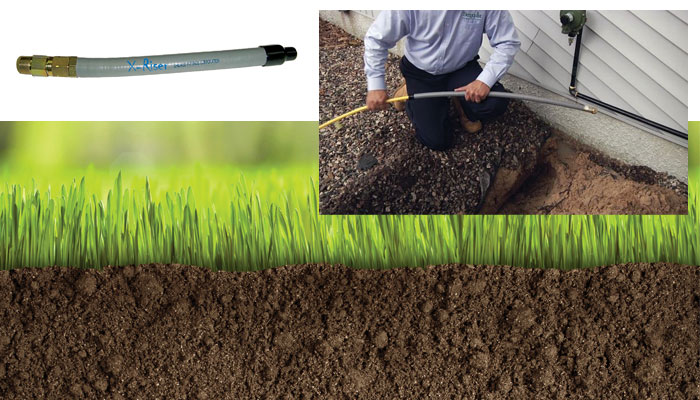X-Riser is designed to make polyethylene piping less expensive than copper
Propane tank installers have often made copper their first choice for underground piping runs, but Bergquist Inc., a distributor of wholesale propane equipment, is working to change their habits and popularize polyethylene as an alternative.
Donald Heller, Bergquist’s Vice President of Propane Technologies, told Oil & Energy that some installers make copper their “default” choice because they consider it less expensive to use on runs shorter than 50 feet. “When I talk to customers, they have this thing in their head of a break-even point,” he explained. “They take the price of copper per foot and then look at the price of plastic with a riser. If it’s a long run, they know the poly plastic is more economical, and they would go with that. But with 50 feet or less, they would often go back and use copper because it was less expensive than the plastic and the risers together.”
A few years ago, Bergquist decided to address the cost of risers in order to help contractors embrace polyethylene as their first choice for underground connections between propane tanks and the homes or appliances they serve. “We think polyethylene is superior,” Heller sad. “It’s long lasting. There are no underground joints. There is no need to cut and thread pipe. It’s easier to use than copper and has better longevity.”
There is also less waste with polyethylene, because it comes in 500-foot rolls, so there are fewer remnants than there are with copper piping, which ships in shorter lengths.
To drive acceptance of polyethylene, Bergquist targeted the cost of its risers with an eye to reducing the price. If it could eliminate concerns about the cost of risers, Heller said, Bergquist could persuade installers to make polyethylene their default material for underground runs.
Working with its partner Chicago Fittings, Bergquist developed a new product it calls the X-Riser that, Heller says, offers a good combination of economy and functionality. “Our goal with the X-Riser is to change that way of thinking,” Heller said.
When developing a new product, Bergquist usually focuses on features and benefits at the outset and develops pricing at the end. With the X-Riser, though, the price point was established first, Heller said. The focus was on getting the price below a certain threshold so that it breaks even with copper and is more economical to use all the time,” he explained. “That way service men will always use it as the default and always have it on the truck.”
Bergquist and Chicago Fittings succeeded in getting the X-Riser price down, and their cause got a boost as the commodity price of copper increased, making copper piping more costly than it had been.
Another priority in developing the X-Riser was to create a design that required no underground connections, so that there would be no leak points underground. Bergquist also wanted the new riser to have a compression fitting that was simple and did not require a lot of skills to deploy. Chicago Fittings outfitted the X-Riser with a stop compression fitting that provides a metal-to-metal positive stop. Because the stop is metal-to-metal, it cannot be over-tightened and distort the seal.
“It is a very simple system that is installable by one person,” Heller said. The X-Riser also features a swivel at the regulator connection for ease of installation and uses an O-ring that is bi-directional, so it cannot be misinstalled. The O-ring is the X-Riser’s only loose part.
X-Risers are available in ½” and ¾” sizes in lengths of 3, 6 or 8 feet. For more information, visit www.Bergquist.com. Bergquist has provided an instructional X-Riser video on its site.


